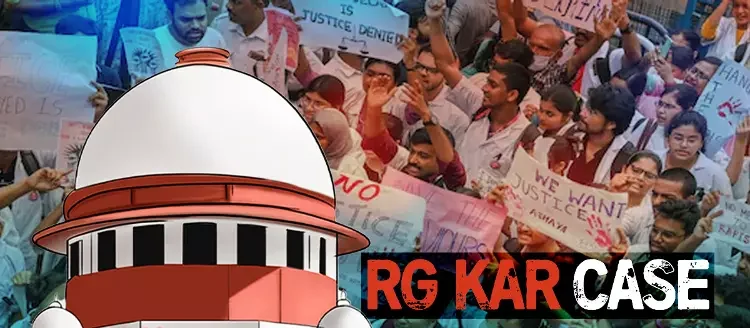Today, the Federation of All India Medical Association (FAIMA) has filed an intervention application before the Supreme Court seeking interim protection for doctors till the recommendations of the National Task Force (NTF) constituted by the Court are implemented.
They also sought the inclusion of a representative from the Resident Doctor in the NTF.
The Supreme Court on August 20 passed an order in the suo motu case taken over by the court the rape and murder of a trainee doctor at the RG Kar Medical College Hospital, Kolkata.
A bench comprising Chief Justice of India DY Chandrachud, Justice JB Pardiwala and Manoj Misra formed an NTF to address the systemic issues regarding the lack of safety for medical professionals.
As per the application of FAIMA, doctors have time and again been subjected to alleged instances of violence and threat to their safety and security. It has bene stated that doctors almost risk their lives while meeting the family members of the deceased patient.
FAIMA notes that there have been several such reported instances, wherein the doctors have immensely suffered due to such instances of violence.
The concerns raised by FIAMA are:
(1) Health care workers who form an important segment of the society are suffering from unhealthy working conditions and issues pertaining to their safety, which is a part of their fundamental right to work. Therefore, lack of safe working environment is violation of their fundamental right to work.
(2) Due to lack of institutional safety, many doctors (especially women doctors) even at the best and most reputed institutions find it unsafe to work and complete their years of residency in the hospital.
(3) By virtue of the very nature of their profession, healthcare workers are entitled to certain degree of protection and safety mechanisms at the workplace. Life or death of a patient is not in their hands, however, on a regular basis they have to face a traumatic situation where they almost risks their lives if they have to face the family member/relative of the deceased.
By virtue of the nature of the profession the doctors are more prone to getting attacked by the family members of the patients in case where medical outcomes are unfavourable. Such incidents compromise the safety and well-being of healthcare providers and create an environment of fear and insecurity, which is fundamentally incompatible with the effective delivery of medical care.
(4) The working conditions for doctors and nurses, are often not secured and there a high risk to their personal safety and security, particularly during night shifts. The provision of secure resting areas, proper lighting, and well monitored corridors is essential to prevent assaults and ensure the safety of healthcare workers.
Such reforms could include the implementation of enhanced security measures in hospitals, such as the installation of CCTV cameras, the presence of trained security personnel, and the establishment of clear protocols for responding to violent incidents.
(5) The execution of the laws in the states such as Maharashtra , Kerala, Karnataka, Telangana, West Bengal, Andhra Pradesh and Tamil Nadu which have enacted legislation to protect healthcare service professionals, is extremely poor. Without proper execution, there is no effective mechanism to ensure that there is no breach.
(6) It is of utmost importance that there is adequate representation from the Resident doctors in the NTA since they experience the real time problems on a routine basis and may be in a position to offer a real time solution to these problems. Involvement of the resident doctors will ensure that comprehensive guidelines are formed after holistic discussion with all stakeholders.
(7) The doctors are subjected to inhuman treatment on a routine basis. Even while they are on a 36 hour duty, they are faced with extremely deplorable work conditions which includes no place to rest, lack of sanitation and hygienic work conditions, one bathroom at times for one department. The doctors and bed ratio never matches and there is always a dirth of number of beds for the doctors to rest even for few hours while they are on an intense 36 hours or 48 hours duty.
(8) Most of hospitals are lacking proper grievance redressal mechanism which can cater to the exigencies been faced by the doctors and provide for immediate attention to certain serious complaints including violence, breach of safety issues, issues concerning sexual harassment, among others.
(9) Facilities provided to doctors specially in the government hospitals and medical colleges are not up to the mark of as they are subject to poor sanitary facilities which includes unhygienic washrooms and hostel rooms. Bad quality of drinking water and insufficient rooms to take rest during prolong duty hours.
Therefore, the interim measures sought by them are:
(1) Inclusion of a representative from the Resident Doctor as a part of NTA;
(2) Direct the implementation of the Central Protection Act for the safety and security of the doctors.
The FAIMA has also sought urgent interim measures till the time the NTA’s recommendations are implemented. These interim measures specifically emphasise the plea of female doctors, who are petrified after the alleged incident. It has been stated that the families of female doctors are not allowing them do attend night duties.
Therefore, the interim measures sought from the court with immediate effect are:
(1) CCTV monitoring of all sensitive areas, including hospital and hostel entrance and exit gates and the corridor areas,
(2) Due compliance of the provisions of the Sexual Harassment of Women at Workplace (Prevention, Prohibition and Redressal) Act 2013 including the condition of having a 24 x 7 emergency distress call facility,
(3) Ensure that the number of bed to the number of doctor’s ratio is equal for the doctors doing the 36 hours or 48 hours duty.
#airr #news #airrnews #channel #Legal #case #India #court #highcourt #supremecourt




